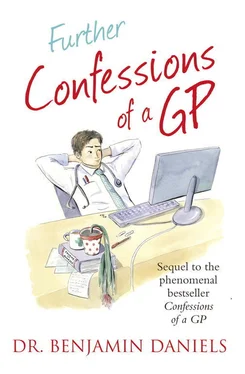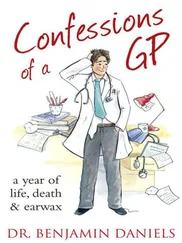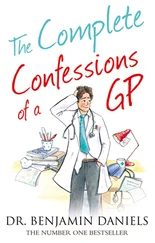‘You’ve gotta sort this out, Doc. I can’t get no business.’
Danni was pointing to an unpleasant looking cold sore on her upper lip. It had become infected and scabby lesions were spreading up to her nose and cheek.
As a sex worker, the infection on her face meant that she couldn’t get any clients and so couldn’t earn any money. If she had been a teacher with a hoarse voice or a carpet fitter with bad knees I could have given her a sick note so that she could get sick pay, but in her line of work there wasn’t that sort of safety net.
‘I can’t even hide it with make-up.’
Danni had been my patient for some time and I knew her biggest concern about not working would be that she couldn’t afford to buy herself any heroin or crack.
‘How are you buying your gear if you can’t work?’
‘I’ve had to go to the clinic and get some methadone.’
I had once thought that methadone was used to wean people off opiates, but my patients who are drug users mostly just use it to keep them going if they can’t get hold of any heroin. Some of them stay on methadone for years and years, constantly putting off the gradual reduction of the dose that is supposed to wean them off drug dependency for good.
‘Are you on benefits?’ I ask.
‘No, most of the girls are on benefits, but I don’t think it’s right getting money from the government when I’m earning.’
I was surprised by Danni’s moral stance. It seemed odd when someone who was living so far outside of what might be considered ‘morally normal’ was taking a principled stand about claiming benefits. I doubt she ever paid tax on her earnings, but even so her sense of ethical responsibility was admirable.
Danni only ever came in to see me for emergency appointments. I could often help with the superficial problems, such as dealing with an abscess from where she had injected heroin, or treating a sexually transmitted infection, as I had last time she had been in. Frustratingly, I could never get to the real root of her problems, which was depression and addiction.
It didn’t take long to prescribe Danni some antibiotics for the infection on her face, but she didn’t seem to want to leave. ‘While I’m here, Doctor, I wondered if I could just talk to you about something else?’
‘Well, not really, Danni. I fitted you in for an emergency appointment and I’m already running late. The waiting room is heaving.’
‘Oh yeah, of course, Doctor, I’m sorry. I don’t wanna waste your time.’
I felt instantly guilty for cutting Danni short. It was true that I was running late and the waiting room was full, but the other reason I was keen for Danni to leave was that she always made me feel so bloody useless. Her life was so complex and chaotic that I never felt able to even scratch the surface of her problems. I couldn’t cure the general sense of misery that ran at the heart of her day-to-day existence. There was nothing I could do to make her life anything close to resembling happy, so I really just wanted her to leave my room so that someone whom I could actually help might come in.
I once heard someone say that life was like treading water in a swimming pool of raw sewage and that the job of a GP is to direct people to the shallow end. Danni was drowning in the deep end and if I couldn’t dive in and drag her out, the least I could do was offer her a sympathetic ear while she flailed around in the faeces.
‘Sorry, Danni, what were you going to ask me?’
‘Well, it’s just that I’ve got no money, and until my face gets better I can’t earn anything and well… I’m just really hungry.’
A tide of genuine shame washed over me. Danni was suffering from that such basic but unpleasant of human sensations – hunger. And oddly enough that was one of her few problems I could help with. There wasn’t a huge amount of food in the building, but I found an apple, four packets of spicy tomato and vegetable cup-a-soup and half a packet of chocolate digestives. I shoved them all into a carrier bag and pressed it into Danni’s hand. It didn’t constitute the most appetising or nutritious of suppers, but it was likely to contain more calories than she had eaten in days. I did at one point consider giving her a tenner so she could buy herself a hot dinner, but giving cash to patients is crossing a boundary too far, and besides, however hungry she was, the money would have been spent on drugs rather than food.
Danni clearly felt a bit awkward accepting my gift but hunger soon took precedence over pride and she gratefully shoved the food parcel into her handbag.
‘You really didn’t have to do that, Doctor. I could have nicked myself something from Sainsbury’s.’
‘It’s no bother, Danni. The last thing you need is to get caught shoplifting again.’
Danni gave me a smile and left. She looked genuinely touched by what she perceived to be a great act of kindness. The reality was that I was relieved to be able to do something simple, practical and worthwhile rather than squirm in my chair feeling completely useless in the way I normally did. Danni was still drowning in the swimming pool of excrement, but at least she could nourish herself with a few chocolate digestives chucked at her from the side.
Sue, our receptionist, was always the first to know everything about everyone in our surgery, so it was no surprise that she was the one to tell us that Mr Brading had died. ‘Oh yeah, Mr Brading. Not seen him for a while,’ was my comment when she first told me the news.
‘Well, that’s not surprising. His neighbours reported a smell coming from his flat. When the police broke in they found him half decayed with an army of maggots having taken up residence. There was unopened post from over four months ago.’
I could actually remember Robert Brading very well. He was a big chap who smoked and drank too much. He came in fairly often and he liked to talk about his time doing military service and his love for motorbikes. I mostly lectured him on stopping smoking and improving his diet. At his last appointment with me I organised a blood test and asked him to come back and see me the following week. He made the appointment, but didn’t turn up. That was four months ago and was probably the week he died. How could no one on the planet have noticed he was gone for all that time?
Perhaps saddest of all is the fact that last month was his 70th birthday. Rather than celebrating with family and friends, he had been lying decaying in his armchair, the day passing by unnoticed. I hope that the pile of unopened mail on his doormat included at least one or two birthday cards.
I, of course, am equally guilty of being oblivious to Mr Brading’s sudden demise. I had sat at this desk seeing patient after patient with ailment after ailment. I was focused on those in front of me rather than wondering why a patient had suddenly stopped visiting me. Scrolling through the notes of our previous consult-ations, I see that we had seen each other numerous times in the few months before his death. Never once did I ask about family or friends or find out who he was as a person. All that I appeared to have offered him was a series of lectures on improving his lifestyle: Give up smoking! Lose weight! Eat less salt! A bombardment of instructions guided by my computer flashing up a succession of targets that Mr Brading was failing to meet. He had wanted to talk to me about motorbikes and his days in the army but I hadn’t had time for that.
I went home that night trying to imagine how anyone could live for 70 years and then die unnoticed. I hadn’t known Mr Brading personally, but surely there must have been times in his life when he had friends and family. Was there a moment that he knew he was dying and if so, did he regret how isolated he had become? Bronnie Ware, an Australian palliative care nurse, wrote a fascinating essay listing the biggest regrets of the dying. She consistently observed that one of the biggest regrets of those soon to depart was losing touch with old friends. I spent the evening phoning a couple of old university friends who I hadn’t seen for far too long. A reunion was organised and after some happy hours of catching up with old chums, I quietly toasted Mr Brading for reminding me of life’s priorities.
Читать дальше
Конец ознакомительного отрывка
Купить книгу











![Benjamin Franklin - Memoirs of Benjamin Franklin; Written by Himself. [Vol. 2 of 2]](/books/747975/benjamin-franklin-memoirs-of-benjamin-franklin-wr-thumb.webp)
![Benjamin Franklin - Memoirs of Benjamin Franklin; Written by Himself. [Vol. 1 of 2]](/books/748053/benjamin-franklin-memoirs-of-benjamin-franklin-wr-thumb.webp)